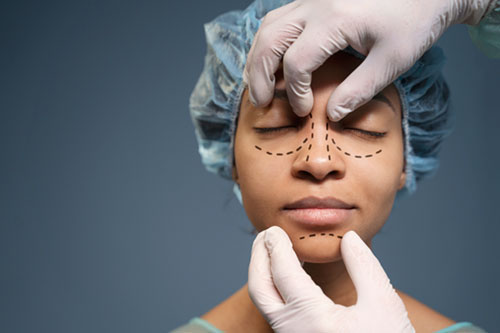Plastic Surgery Inland Empire: Achieve Your Desire Look with Specialist Care
Plastic Surgery Inland Empire: Achieve Your Desire Look with Specialist Care
Blog Article
Checking Out the Emotional and Social Elements That Drive Individuals to Consider Aesthetic Surgery as a way of Improvement
The decision to seek plastic surgery often expands past simple aesthetic appeals, linking with social and emotional characteristics that warrant comprehensive assessment. Aspects such as self-confidence, prevalent social charm standards, and the prevalent influence of social networks assemble to shape private inspirations for medical improvement. As these impacts come to be progressively noticeable, understanding the underlying emotional and cultural contexts is crucial. What continues to be to be checked out is the profound impact these aspects have not only on individual identity yet additionally on more comprehensive social norms and values surrounding appeal and approval.
The Duty of Self-Esteem
Self-confidence significantly influences an individual's choice to pursue plastic surgery. People with reduced self-esteem commonly regard themselves in a negative light, leading to sensations of insufficiency concerning their physical appearance. This adverse self-perception can drive them to seek medical treatments as a technique of boosting their self-image. The need for improvement in one's appearance is often connected to a belief that such changes will certainly elevate their overall self-respect and self-confidence.

Inevitably, the duty of self-confidence in the decision-making process regarding cosmetic surgical procedure highlights the intricate interaction between body image, personal satisfaction, and psychological wellness. Recognizing this connection is vital for medical care specialists to ensure that patients are making informed decisions rooted in sensible assumptions and emotional well-being.
Social Charm Criteria
Influenced by prevalent media representations and social narratives, social charm standards play an essential role fit people' assumptions of their own bodies. These criteria are frequently identified by an idyllic type of elegance that highlights qualities such as slimness, youthful vigor, and balance. As these perfects are continued via different channels, consisting of movie, television, and marketing, people often internalize these messages, leading to dissatisfaction with their natural look.
The implications of these social norms expand past aesthetic preferences; they can affect self-esteem, psychological health, and social partnerships. People who perceive themselves as disappointing these requirements may experience feelings of insufficiency, prompting a need for cosmetic surgical procedure as a means of accomplishing social authorization. This quest is usually sustained by the idea that satisfying these perfects will certainly boost not only physical appearance but likewise social standing and personal fulfillment.

Impact of Social Media Site
The effect of social beauty standards is further intensified by the increase of social media platforms, where curated images and idealized depictions of charm are common. Individuals are frequently subjected to filteringed system and modified pictures, which often portray unattainable physical features. This direct exposure cultivates a culture of contrast, leading individuals to analyze their very own look versus these frequently impractical criteria.
Social media influencers and celebrities often promote aesthetic procedures, stabilizing the notion that surgical improvements are a feasible ways for attaining social ideals (plastic surgery rancho cucamonga). The presence of these improvements can create a perception that undertaking cosmetic surgery is a typical practice, thus affecting individuals to take into consideration comparable treatments as a pathway to enhanced self-worth and social acceptance
Additionally, the interactive nature of social media enables prompt responses through likes and remarks, even more enhancing the wish to comply with prominent appeal criteria. Such communications can worsen feelings of insufficiency and drive people toward cosmetic surgical procedure as a way of gaining validation. Eventually, social networks plays a pivotal role in forming understandings of elegance, which substantially affects the decision-making processes bordering cosmetic surgical procedure.

Cultural Perspectives on Look
Throughout different cultures, assumptions of look are deeply rooted in historic, social, and financial contexts, forming individuals' sights on charm and worth. In many societies, look works as a significant marker of identity, affecting social standing, professional possibilities, and individual connections. For instance, in some societies, light skin is often connected with wide range and benefit, while others might idealize darker skin tones as symbols of stamina and authenticity.
Additionally, traditional appeal criteria are frequently perpetuated via cultural narratives, media depictions, and household influences, resulting in varying ideals throughout various regions (plastic surgery rancho cucamonga). In Western cultures, the emphasis on youth and physical conditioning usually drives people towards aesthetic enhancement, while in specific Eastern cultures, more subtle changes straightened with traditional visual appeals might be preferred
Globalization and the spreading of digital media have actually additionally made complex these dynamics, creating a hybridization of charm ideals that goes beyond geographical boundaries. As people increasingly browse these cultural stories, the pressure to discover this info here comply with certain appearance requirements can bring about the desire for cosmetic surgical treatment, reflecting a complex interplay of social worths and personal ambitions. Understanding these cultural viewpoints is important in addressing the motivations behind cosmetic surgical treatment factors to consider.
Emotional Impacts of Plastic Surgery
Numerous individuals looking for plastic surgery record experiencing extensive mental effects that can dramatically modify their self-perception and psychological health - plastic surgery rancho cucamonga. The wish for physical improvement commonly comes from underlying problems such as low self-confidence, body dysmorphic problem, or social stress relating to appeal standards. For some, the immediate post-operative stage can result in a momentary increase in positive self-image and satisfaction with their look, cultivating a feeling of empowerment
Nevertheless, these positive feelings might not be enduring. Study suggests that while some patients experience boosted self-confidence, others may encounter increased anxiety or depression if their assumptions are not satisfied. This disparity can emerge from impractical ideals perpetuated by media representation and social narratives surrounding charm.
In addition, the psychological ramifications of plastic surgery extend beyond the person. Relationships with friends and family might be stressed as social characteristics change, bring about sensations of isolation or alienation. Ultimately, the mental influences of plastic surgery are complex and complex, needing careful consideration by both possible patients and medical care service providers to guarantee informed decision-making and realistic assumptions.
Verdict
Finally, the decision to seek cosmetic surgical procedure is dramatically affected by a combination of self-worth problems, social beauty criteria, and cultural perspectives on appearance. The pervasive reach of social media sites even more worsens these stress, advertising unrealistic ideals that individuals often aim to attain. Comprehending these psychological and social factors is important for dealing with the inspirations behind plastic surgery, highlighting the requirement for a more nuanced discussion bordering charm and self-acceptance in contemporary society.
The choice to go after cosmetic surgical procedure typically expands beyond simple appearances, intertwining with social and mental dynamics that warrant thorough assessment. Eventually, social media plays a critical duty recommended you read in shaping perceptions of elegance, which dramatically influences the decision-making procedures surrounding cosmetic surgery.
As people increasingly navigate these cultural stories, the stress to conform to certain appearance criteria can lead to the need for cosmetic surgical treatment, reflecting an intricate interplay of personal desires and cultural worths.In verdict, the decision to pursue cosmetic surgical procedure is considerably influenced by a combination of self-esteem issues, social beauty requirements, and social perspectives on look. Comprehending these social and emotional their website factors is vital for addressing the motivations behind cosmetic surgery, highlighting the requirement for a more nuanced conversation bordering elegance and self-acceptance in modern culture.
Report this page